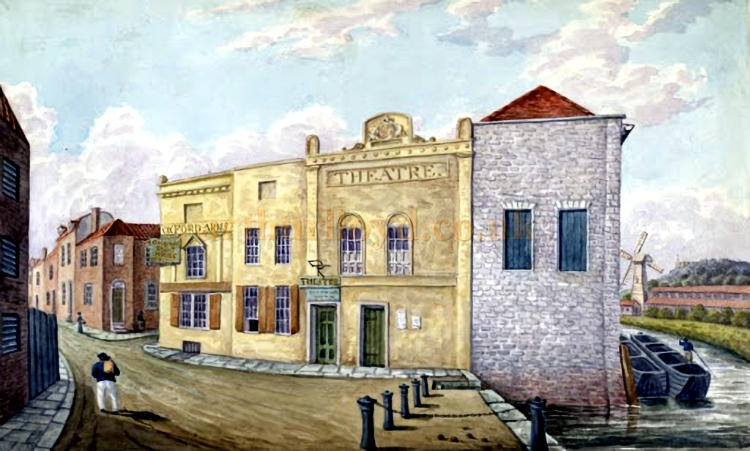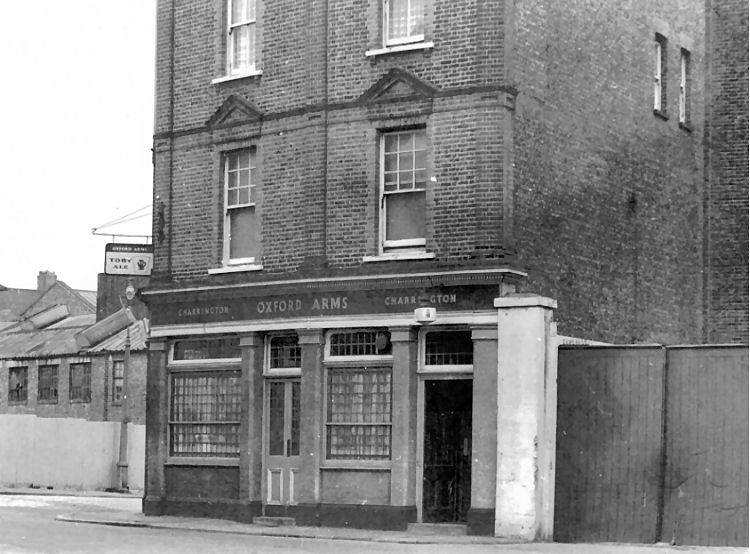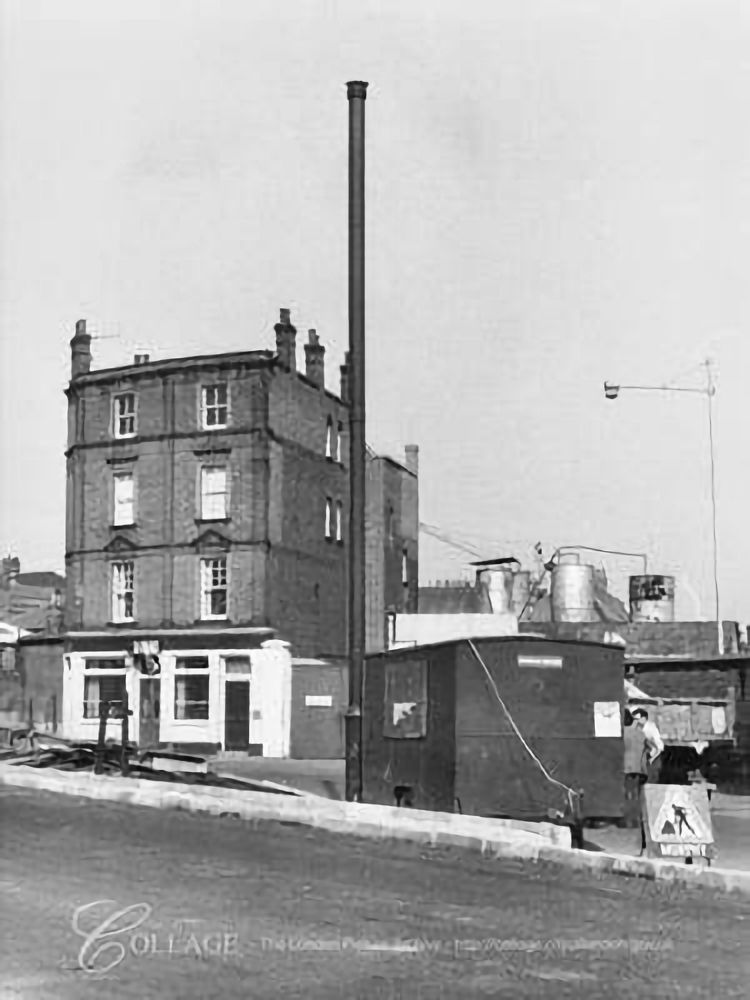|
32 Church Street
St. Paul
Deptford

Above painting showing the "Oxford Arms" (centre left) and Deptford
Theatre demolished 1865. |

Above photo, pre 1965. |

Above photo, 1974. |
Changed name to the "Bird's
Nest" date unknown.
Now part of Greater London, this area was indeed Kent before 1965. Hence,
I will be adding information regarding this pub as and when I find or it is
sent to me, but at present I'll be concentrating on the areas that are
within the Kent boundary today.
Your help is appreciated, and every email is answered.
|
From the Maidstone Gazette and West Kent Courier, 10, January, 1831.
To Publicans and Others. To Let.
A Free Public House: Tenant at Sell. Rent £55. Taxes £14 a year. The
trade doing 8 butts of porter per month. Coming in £550. Any person with
£300 can be accommodated with the remainder.
The "Oxford Arms," Deptford.
|
|
Kentish Gazette, 20 February 1844.
SUPPOSED TRANCE.
During the past week, intense interest has been felt in the upper part
of Deptford and
Greenwich, in consequence of the belief that a young man named William
Francis, on
whom a coroner’s jury had sat, and returned a verdict that he died from
natural causes,
was still alive, but in a trance.
The following are the facts of this remarkable case:— The young man was
(or is) the son
of Mr. Francis, the landlord of the "Oxford Arms," in Church-street,
Deptford; and on
Friday week he was at the "Marquis of Granby" public-house, Lower
Watergate, Deptford,
which it appears is kept by his brother. He went into the tap-room about
seven o'clock in
the evening, when he complained of a violent palpitation of the heart,
and almost
instantly fell down. He was picked up by some of the customers quite
stiff and cold. Mr.
Hatfield, a surgeon, was sent for, who pronounced him to be quite dead,
and left. Mr.
Taylor, of High-street, afterwards attended, and although an hour had
elapsed,
succeeded in bleeding him, but tried several remedies ineffectually to
restore animation.
The inquest was called the next day, and some of the jury expressed
their surprise that
Mr. Hatfied had not attempted to bleed the patient when he went, and
thought he
ought to be sent for, and that a post mortem examination should be made.
The coroner,
however, expressed so strong an opinion that the young man had died
instantly from a
disease of the heart, and that it was unnecessary to call the surgeons,
or have a post
mortem examination, that the jury returned the above verdict. The body
was afterwards
removed to the "Oxford Arms," when the countenance gradually resumed its
natural
colour, and the chilliness of death gave way to a slight warmth. Two
surgeons have been
called in, and on opening the eyes, expressed their surprise, as they
did not appear set
in death, but would not at that time give a positive opinion on the
point. The relatives, as
may be supposed, are in a state of deep anxiety, and indulge in hope of
his recovery. He
has been taken out of his coffin, and placed in bed until the issue is
known.
|
|
Kentish Gazette, 27 February 1844.
The Case of "Supposed Trance." at Deptford.
Upon inquiry being made on Monday afternoon into the facts of the case
as connected
with the supposed trance of the young man William Francis, who lies at
the "Oxford
Arms" Church Street, Deptford. Dr. Arthur, of High Street, states that
no positive
ground ever existed for supposing such to be the case, life undoubtedly
having been
extinct ever since the evening of the 2nd ult., when he suddenly fell
off a table in the
tap-room of the "Marquis of Granby" public house, kept by his brother,
in Watergate,
Deptford. Some symptoms appeared which were considered of a singular
character.
The cornea of the eye lid did not film as is usual after death, and the
limbs continued
elastic; but Dr. Arthur and other medical gentlemen who have seen the
case say that
these results are not at all infrequent when parties die either of
aneurism or
ossification of the heart. The father of the poor lad still persists in
his determination not
to have the body interred while these appearances remain; but as
decomposition is
already manifesting itself on one side of the neck and on the abdomen,
it is most
probably that before long he will see cause to revoke his present
decision.
|
|
Kentish Gazette, 5 March 1844.
CASE OF SUPPOSED TRANCE AT DEPTFORD.
Deep interest has been excited in Deptford respecting a supposed case of
trance, and it is deemed one of the most extraordinary
which has ever come before the faculty. It is necessary to observe, that
two reports which have appeared in some of the papers are
wholly without foundation, and have caused great pain to the relatives.
The first was that decomposition was apparent at the early
part of last week, and subsequently another report was made, that the
body had actually been buried. Even up to Monday not the
slightest appearance of decomposition had taken place. This assertion is
made on the authority of the medical gentlemen who have
from time to time, up to Monday, watched the progress of the case. The
following are the facts which have not been generally
published:—
On Friday, the 2nd of February, Mr. Francis, jun., the son of Mr.
Francis, the landlord of the "Oxford Arms," in Church street,
Deptford, was sitting in the tap room of his brother's house, the
"Marquis of Granby," at the Lower Water gate, Deptford, when he
fell down apparently in a fit, and a medical gentleman pronounced him to
be dead, and took no means to restore what has since
been declared by competent authorities to have been only suspended
animation. Mr. Taylor, surgeon, of High-street, afterwards
went to the house, and made several skilful experiments; and although an
hour after the young man had been pronounced to be
dead, succeeded in bleeding him, but not to restore animation. On the
jury being empanelled one of the jurymen was also taken in
a fit, whether from the sight of the body or not can only be imagined,
but for a few moments a fatal result was expected. The jury
generally were not satisfied with the general evidence, and requested
the attendance of the medical gentlemen who attended at the
time, or that a post mortem examination might be made, but the dictum of
the coroner, that the deceased died from an
enlargement of the heart, was submitted to by the jury, who appeared,
however, not quite satisfied, but returned a verdict that the
deceased died from natural causes. Almost immediately afterwards a
brother of the deceased was seized with a fit intermittingly for
three hours. The surgeon then called in, on hearing the probable cause
of excitement, at once pronounced the verdict to be
premature, and that the coroner was exceedingly wrong in directing the
jury in such a case, and he himself doubted whether death
had been so instantaneous. The brother was bled, and recovered, and
subsequently Mr. Atkins, the surgeon spoken of, afterwards
saw the body, which then exhibited all the freshness and bloom of
health. Several medical and surgical men in the vicinity of the
place, and from the London hospitals, also visited the place; from their
vague expressions there appeared no doubt that life was not
extinct, at least for nine or ten days after the holding of the inquest.
On Friday Messrs. Downing (the surgeons to the police force)
and Mr. Taylor, the surgeon before alluded to, again visited the house,
and gave a most unqualified contradiction to decomposition
having taken place. Mr. Halse, a professor of galvanism, recommended
galvanism, but it was not deemed expedient to try it. On
Monday, Mr. Hope, of Deptford, came, prepared with a galvanic battery,
but, on viewing the body, considered it advisable not to
make the experiment; he, however, recommended that the head should be
raised more, so that if any life did remain, the blood
should not flow to the head. He also strongly recommended, that as no
decomposition had taken place, no interment should be
made until decomposition was unequivocal, and then, for the satisfaction
of the relatives and justice to the medical profession, a post mortem examination should be made. He observed that the limbs were not
stiff and the sides were almost warm, and not like death.
The relatives still entertain hopes, and the body is frequently washed.
It is, however, in the coffin. The limbs are up to the present
time perfectly supple. Twenty-four days have elapsed since the inquest.
|
|
Kentish Gazette, 12 March 1844.
THE CASE OF SUPPOSED TRANCE AT DEPTFORD.
In the last notice of this extraordinary case it was stated, on the
authority of several surgeons of experience, that decomposition of
the body was going on, although not apparent to a non-professional
person. On Friday, however, there were such unequivocal signs
of decomposition having taken place, that the parents of the deceased
determined on having a post mortem examination, and
Messrs. Downing, surgeons to the R division of police, and Mr. Caleb
Taylor, surgeon of High-street, Deptford, were requested to
perform the operation, which they did in a most minute and careful
manner, and in which they were occupied several hours. The
following is an authorised copy of their report:—
"Friday, March 8.
"POST MORTEM EXAMINATION OF THE BODY OF HENRY FRANCIS.
"The body was well-proportioned, robust, and above the middle stature.
The calvariuin being removed, the dura mater and
arachnoid were found translucent and healthy, and no unusual quantity of
serum in its cavity, but the vessels of the pia mater were
remarkably congested with venous blood, the larger ones being quite
prominent from distension and their minutest ramifications
filled. The brain was also found very much congested, and sections of it
being made, bloody points in very unusual number were
shown, from extreme congestion of its small vessels. The ventricles
contained no unusual quantity of serum, butt the plexus
choroides was much congested. No clot of estasusations was found.
"On opening the chest the pericardium was found to contain about four
ounces of redish serum, the left ventricle of heart dilated
and hypertrophied; the right ventricle, semilunar, mitral, and trienspid
valves and aorta quite healthy, but the right ventricle, venae
cavae ascendens and desceudens, brachio-cephalics, coronary, and other
veins, were much distended with blood; the left pleural
cavity contained about eight ounces reddish serum (this as well us the
contents of the pericardium being probably the result of
cadaveric exosmosis), the membranes themselves being healthy. The right
pleural cavity was completely obliterated by old adhesion,
the lung being adherent throughout from apex to base, so that it was
impossible to remove it without laceration; both lungs were
also much congested, but otherwise healthy. The stomach contained some
undigested food, amongst which were found many large
masses of cheese, considerably larger than filberts their nature being
evident when cut into. The stomach was healthy, except
being, in common with all the organs of the body, much congested, which
was also the case with the kidneys, being large of a deep
chocolate colour. The liver spleen, intestines, and peritoneum healthy.
"From this examination, it is evident that disease of the heart was not
the immediate cause of death, it having been produced by
congestive apoplexy.
"C. TAYLOR. E. DOWNING."
The foregoing document will no doubt be read with great interest by the
profession as well as the public. One remarkable fact is,
that amongst the number of professional gentlemen who viewed the body
during the 35 days after death, only one gentlemen
expressed an opinion as to the cause of death which has been borne out
by the post mortem examination, and that was the
gentleman who was mistaken for Mr. Callaway by the family (on whose
authority it was stated Mr. Callaway and Mr. Bransby Cooper
had seen the body). The gentleman referred to pronounced that the
deceased had died from paralysis of the brain, and pointed out
the proper course which should have been pursued. Mr. Taylor certainly
bled the deceased half an hour after the first surgeon had
pronounced him dead, and the blood flowed copiously from the arm.
Messrs. Downing and Taylor have not at present given any
opinion as to the cause of the extraordinary retention of natural
appearances for so great a length of time. Even on opening the
body the effluvium was very slight.
This case clearly shows the necessity of a more patient inquiry by
coroners’ juries, as in this case the coroner thought it unnecessary
to call the medical man, himself pronouncing that deceased died from an
enlargement of the heart, on which the jury returned a
verdict.
|
|
Orr's Kentish Journal, 22 February 1862.
DEPTFORD. Transfer or Licences.
"Oxford Arms," Church-street, to William Wolfe.
|
LICENSEE LIST
GRAVESON John 1826+
JAMES Charles Andrew 1832+

SMITH William Thomas 1840+
FRANCIS William 1847-Jan/54 (age 65 in 1851 ) )
WRIGHT Joseph Jan/1854-Aug/55
LEWIS George Aug/1855-Feb/62
WOLFE William Feb/1862+
THORNTON Frederick Aug/1866-82+ (age 47 in 1871 ) )
WOOD William 1884+
SWAINSON Walter 1891+
RADFORD Richard Joyce 1895+
BELL Edward 1899+
NAPPER William George 1910-21+ (age 49 in 1911 ) )
BROWN Edward B 1934-38+
NUNN Reginald James 1944+
https://pubwiki.co.uk/OxfordArms.shtml
 From the Pigot's Directory 1832-33-34 From the Pigot's Directory 1832-33-34
 Census Census
|


